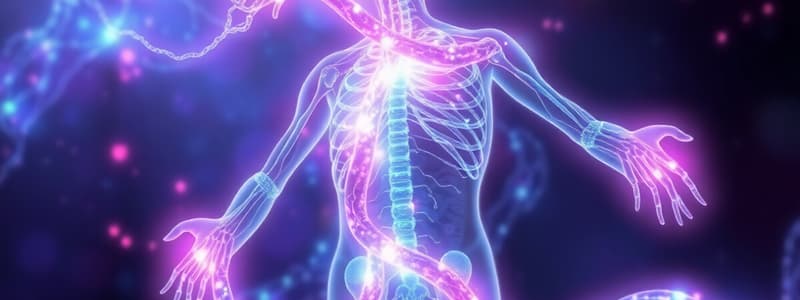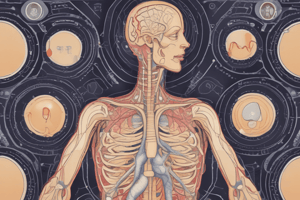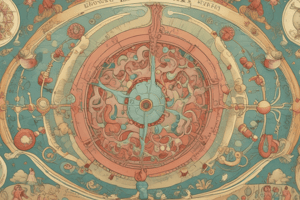Podcast
Questions and Answers
What do hormones primarily serve as in the body?
What do hormones primarily serve as in the body?
- Nutrients for cells
- Energy sources
- Structural proteins
- Chemical messengers (correct)
The endocrine system consists of ducted glands that secrete hormones.
The endocrine system consists of ducted glands that secrete hormones.
False (B)
What are target cells?
What are target cells?
Cells that are influenced by a specific hormone.
The ________ system is one of the two major control systems of the body in addition to the endocrine system.
The ________ system is one of the two major control systems of the body in addition to the endocrine system.
Where are hormone-secreting cells found?
Where are hormone-secreting cells found?
Match the following components of the endocrine system:
Match the following components of the endocrine system:
Hormones directly connect different organ systems without the need for any other signals.
Hormones directly connect different organ systems without the need for any other signals.
What is the primary role of endocrine glands?
What is the primary role of endocrine glands?
The endocrine system is primarily anatomically connected.
The endocrine system is primarily anatomically connected.
What is the focus of the chapter on endocrinology?
What is the focus of the chapter on endocrinology?
Name one organ that has dual functions, including hormone secretion.
Name one organ that has dual functions, including hormone secretion.
The ________ is a part of the brain considered part of the endocrine system.
The ________ is a part of the brain considered part of the endocrine system.
Match the following components to their function:
Match the following components to their function:
Which of the following is NOT a role of hormones?
Which of the following is NOT a role of hormones?
The posterior pituitary releases hormones that function as neurotransmitters.
The posterior pituitary releases hormones that function as neurotransmitters.
What do hormones secreted by endocrine glands typically enter before reaching target cells?
What do hormones secreted by endocrine glands typically enter before reaching target cells?
Which of the following hormones is considered a glucocorticoid?
Which of the following hormones is considered a glucocorticoid?
Aldosterone is produced by multiple parts of the adrenal cortex.
Aldosterone is produced by multiple parts of the adrenal cortex.
What is the primary source of steroid hormones in the body?
What is the primary source of steroid hormones in the body?
Cortisol and _____ are glucocorticoids produced by the adrenal cortex.
Cortisol and _____ are glucocorticoids produced by the adrenal cortex.
Why are steroid hormones not stored in membrane-bound vesicles?
Why are steroid hormones not stored in membrane-bound vesicles?
Match the following hormones with their respective classifications:
Match the following hormones with their respective classifications:
What determines the final steroid hormone product in a cell?
What determines the final steroid hormone product in a cell?
Steroid hormones are highly soluble in blood.
Steroid hormones are highly soluble in blood.
What is the primary function of the hormone T4 produced by the thyroid gland?
What is the primary function of the hormone T4 produced by the thyroid gland?
All hormones are removed from the blood at the same rate.
All hormones are removed from the blood at the same rate.
Which organs primarily metabolize and excrete hormones from the plasma?
Which organs primarily metabolize and excrete hormones from the plasma?
Hormones can have __________ effects on target cells that possess specific receptors.
Hormones can have __________ effects on target cells that possess specific receptors.
Which type of hormones are mainly removed from circulation more slowly?
Which type of hormones are mainly removed from circulation more slowly?
Match the following hormones with their fates after secretion:
Match the following hormones with their fates after secretion:
The response to a given hormone can occur in any cell of the body regardless of receptor presence.
The response to a given hormone can occur in any cell of the body regardless of receptor presence.
What determines a cell's ability to respond to a specific hormone?
What determines a cell's ability to respond to a specific hormone?
What is the primary mechanism of hormone release described in the content?
What is the primary mechanism of hormone release described in the content?
Insulin secretion is inhibited when plasma glucose concentration decreases.
Insulin secretion is inhibited when plasma glucose concentration decreases.
What regulates the secretion of several hormones according to plasma concentrations?
What regulates the secretion of several hormones according to plasma concentrations?
The action of insulin promotes the facilitated diffusion of glucose through the plasma membrane into the ______.
The action of insulin promotes the facilitated diffusion of glucose through the plasma membrane into the ______.
Match the following hormones with their primary function:
Match the following hormones with their primary function:
Which hormone is specifically mentioned as being stimulated by increased plasma glucose concentration?
Which hormone is specifically mentioned as being stimulated by increased plasma glucose concentration?
All hormone secreting mechanisms are the same and function uniformly.
All hormone secreting mechanisms are the same and function uniformly.
What is the primary feedback mechanism mentioned that regulates hormone secretion?
What is the primary feedback mechanism mentioned that regulates hormone secretion?
Flashcards are hidden until you start studying
Study Notes
The Endocrine System
- The endocrine system is one of the two major control systems in the body (the other being the nervous system).
- The endocrine system is comprised of ductless glands called endocrine glands, which secrete hormones.
- Hormones are chemical messengers that enter the bloodstream and travel to target cells.
- Target cells have specific receptors for hormones, enabling them to respond specifically to certain hormones.
- The heart, although primarily associated with circulation, also contains cells that secrete hormones, making it part of the endocrine system.
- The hypothalamus, a region of the brain, is considered part of the endocrine system.
- The hypothalamus secretes hormones that enter the bloodstream directly, rather than functioning as traditional neurotransmitters acting on adjacent cells.
Hormone Synthesis and Release
- Steroid hormones are derived from cholesterol, and their production depends on the enzymes expressed by the specific cell type.
- Steroid hormones are not stored in vesicles because they can freely diffuse across lipid bilayers, allowing them to move into the circulation once synthesized.
Hormone Fate and Actions
- Steroid hormones are not highly soluble in blood.
- Hormones can be metabolized and cleared from circulation by the liver and kidneys.
- Some hormones can be metabolized into more active molecules within target cells or other organs.
Mechanisms of Hormone Action: Hormone Receptors
- The presence of specific receptors for hormones on or in target cells determines their response.
- Steroid hormones can diffuse through cell plasma membranes into the extracellular space, as opposed to being secreted in the traditional manner.
Hormonal Control by Plasma Concentrations of Minerals or Nutrients
- The secretion of several hormones is directly controlled by the plasma concentrations of specific mineral ions or organic nutrients.
- This regulation often involves negative feedback mechanisms, where the hormone directly affects the plasma concentration of the ion or nutrient that controls its secretion.
- For example, insulin secretion is stimulated by an increase in plasma glucose concentration. Insulin then promotes glucose uptake by skeletal muscle and adipose tissue, restoring normal plasma glucose levels.
Studying That Suits You
Use AI to generate personalized quizzes and flashcards to suit your learning preferences.




